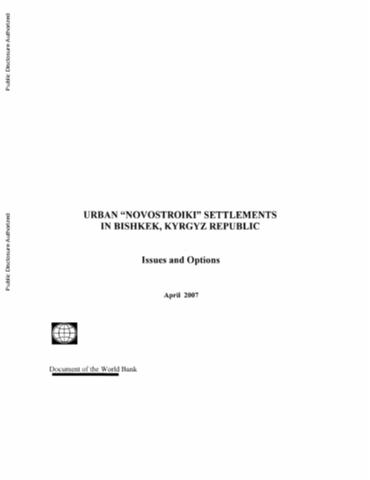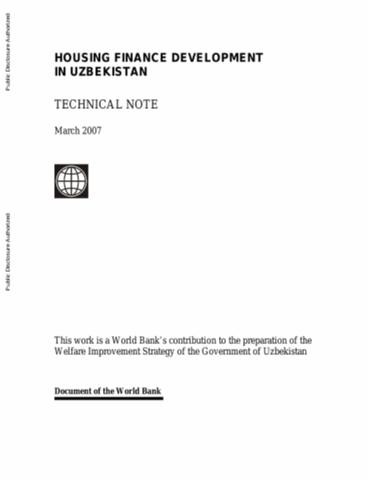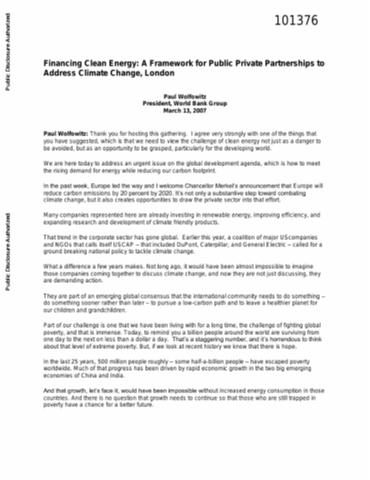The World Bank is a vital source of financial and technical assistance to developing countries around the world. We are not a bank in the ordinary sense but a unique partnership to reduce poverty and support development. The World Bank Group has two ambitious goals: End extreme poverty within a generation and boost shared prosperity.
- To end extreme poverty, the Bank's goal is to decrease the percentage of people living on less than $1.25 a day to no more than 3% by 2030.
- To promote shared prosperity, the goal is to promote income growth of the bottom 40% of the population in each country.
The World Bank Group comprises five institutions managed by their member countries.
The World Bank Group and Land: Working to protect the rights of existing land users and to help secure benefits for smallholder farmers
The World Bank (IBRD and IDA) interacts primarily with governments to increase agricultural productivity, strengthen land tenure policies and improve land governance. More than 90% of the World Bank’s agriculture portfolio focuses on the productivity and access to markets by small holder farmers. Ten percent of our projects focus on the governance of land tenure.
Similarly, investments by the International Finance Corporation (IFC), the World Bank Group’s private sector arm, including those in larger scale enterprises, overwhelmingly support smallholder farmers through improved access to finance, inputs and markets, and as direct suppliers. IFC invests in environmentally and socially sustainable private enterprises in all parts of the value chain (inputs such as irrigation and fertilizers, primary production, processing, transport and storage, traders, and risk management facilities including weather/crop insurance, warehouse financing, etc
For more information, visit the World Bank Group and land and food security (https://www.worldbank.org/en/topic/agriculture/brief/land-and-food-security1
Resources
Displaying 4801 - 4805 of 4907Land Acquisition in Afghanistan : A Report
The purpose of this report is to review
and assess Afghanistan's legal framework regulating
social safeguards (national and local laws, regulations,
procedures and policies) with special reference to the law
and practice of compulsory land acquisition, or
expropriation. The overall objective of the report is to
consider how Afghanistan's legal framework would
address social safeguard issues in upcoming World Bank
Land Reform and Farm Restructuring in Transition Countries : The Experience of Bulgaria, Moldova, Azerbaijan, and Kazakhstan
This paper presents such a stocktaking
of land reform and farm restructuring in four countries
(Azerbaijan, Bulgaria, Kazakhstan, and Moldova) that have
had particular difficulties with land reform, farm
restructuring, farm performance, or rural poverty. It is
organized by case studies, each of which is designed to
analyze a central conundrum about land reform and farm
restructuring in an individual country. Much of the
Urban 'Novostroiki' Settlements in Bishkek, Kyrgyz Republic
The primary purpose of this study was to profile residents and living conditions in novostroiki, or the rapidly growing areas of new self-built construction ringing Bishkek where more than one fourth of city residents now live, in order to identify the major problems and areas for potential future Bank and donor engagement. The study findings are based on analysis of results from a survey of 493 households in nine novostroiki established from 1989-1991, as well as focus group findings, a study of the institutional framework, and a study of sanitation.
Housing Finance Development in Uzbekistan
The Government of Uzbekistan has adopted an important series of initiatives to create a market-based housing finance system, yet recognizes that there remains much work to be done. This note provides guidance on the themes that were discussed with authorities and industry participants during mission to Uzbekistan on November 6-16, 2006 and February 22 to March 2, 2007. The note is based on missions conducted in 2006 and 2007 by Britt Gwinner, FPDSF, and Michael Borish, a review of government documents, and a review of studies conducted by other multilateral institutions.
Financing Clean Energy
Paul Wolfowitz, President of the World Bank, discussed how to meet the rising demand for energy while reducing our carbon footprint. Rich countries need to lead by example, renovating and replacing infrastructure and investing in clean technology. Rich countries also need to lead with direct support to developing nations, both to reduce poverty and reduce carbon emissions. Moving to a low carbon path will require investments, and a long-term equitable global regulatory framework to reduce greenhouse gas emissions.









